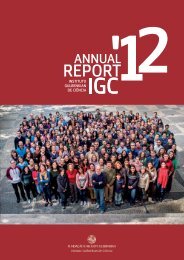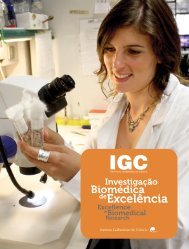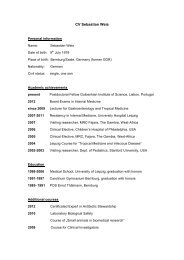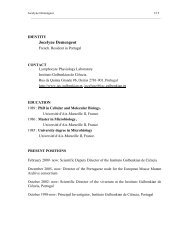organisation - the Instituto Gulbenkian de Ciência
organisation - the Instituto Gulbenkian de Ciência
organisation - the Instituto Gulbenkian de Ciência
- No tags were found...
Create successful ePaper yourself
Turn your PDF publications into a flip-book with our unique Google optimized e-Paper software.
In 2011, CNP investigators began conducting <strong>the</strong>ir research at <strong>the</strong> recently inaugurated<br />
Champalimaud Center for <strong>the</strong> Unknown (CCU). There, in September<br />
2011, <strong>the</strong> first Champalimaud Neuroscience Symposium was held, featuring lectures<br />
by key neuroscientists from across <strong>the</strong> world. Soon after, <strong>the</strong> Ar monthly<br />
event-series began. These outreach events, targeted at a general audience,<br />
explore different aspects of scientific and science-related topics such as<br />
human-machine interface and creativity.<br />
In-house Principal Investigators:<br />
• Megan Carey (Neural Circuits and Behaviour)<br />
• Rui Costa (Neurobiology of Action)<br />
• Inbal Israely (Neuronal Structure and Function)<br />
• Susana Lima (Neuroethology)<br />
• Christian Machens (Theoretical Neuroscience)<br />
• Zach Mainen (Systems Neuroscience)<br />
• Marta Moita (Behavioural Neuroscience)<br />
• Michael Orger (Vision to Action)<br />
• Joe Paton (Learning Laboratory)<br />
• Leopoldo Petreanu (Cortical Circuits)<br />
• Alfonso Renart (Circuit Dynamics & Computation)<br />
• Carlos Ribeiro (Behaviour and Metabolism)<br />
• Luísa Vasconcelos (Innate behaviour)<br />
Research Fellows:<br />
• Adam Kampff (Intelligent Systems)<br />
External Principal Investigators:<br />
• Domingos Henrique (Developmental Biology)<br />
• Rui Oliveira (Animal Behaviour)<br />
FLAD COMPUTATIONAL BIOLOGY COLLABORATORIUM<br />
Head: Luís Rocha<br />
PhD in Systems Science, State University of New York, 1997<br />
Principal Investigator - Complex Adaptive Systems and Computational Biology<br />
The main aim of <strong>the</strong> FLAD Computational Biology Collaboratorium is to establish,<br />
enable, and foster an international, collaborative network of associated<br />
institutions and scientists. It is an open host <strong>organisation</strong> <strong>de</strong>signed to enable<br />
intense cooperation amongst researchers from national and international institutions:<br />
<strong>the</strong> centre hub of a collaborative network of research institutions. Its<br />
principal objectives are to provi<strong>de</strong> suitable facilities for visiting scientists, and<br />
to host informatics technology to enable continuing off-site collaboration and<br />
research in ma<strong>the</strong>matical and computational biology.<br />
The Collaboratorium operates in close synergy with <strong>the</strong> PhD Programme in<br />
Computational Biology: faculty is encouraged to stay longer periods of time to<br />
participate in work groups and collaborative projects hosted by <strong>the</strong> Collaboratorium.<br />
Likewise, visitors to <strong>the</strong> Collaboratorium are encouraged to give seminars<br />
and interact with stu<strong>de</strong>nts and faculty of <strong>the</strong> PhD Programme. Fur<strong>the</strong>rmore,<br />
<strong>the</strong> PhD programme will help i<strong>de</strong>ntify research areas in ma<strong>the</strong>matical and computational<br />
biology that are not yet sufficiently <strong>de</strong>veloped in Portugal. Reciprocally,<br />
<strong>the</strong> growing collaboration network fostered by <strong>the</strong> Collaboratorium, will facilitate<br />
<strong>the</strong> insertion of <strong>the</strong> newly formed computational biology PhDs within <strong>the</strong><br />
Portuguese research and technology communities.<br />
IGC ANNUAL REPORT ‘11<br />
RESEARCH STRUCTURES<br />
106






